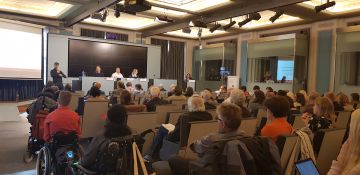Conference: how can the government create an inclusive education system?
Finding inspiration and gathering ideas on inclusive education: that was the goal of the international conference on 8 and 9 October. For this two-day conference, Unia joined forces with the Netherlands Institute for Human Rights and received support from the OHCHR Regional Office in Brussels.
More than 70 academic experts, policymakers, education professionals, and disabled persons organizations (DPO’s) attended the presentations and took part in interactive debates. The goal? Finding inspiration and gathering concrete ideas on how governments can create an inclusive education system.
Everyone has the right to inclusive education
The right to education is a right to inclusive education. This was clarified by Article 24 of the UN Convention on the Rights of Persons with Disabilities (CRPD). Nevertheless, the implementation of Article 24 CRPD has been difficult so far and created a lot of uncertainty. There is a support base for inclusion, but we need innovative and concrete ideas on how governments can create an inclusive education system in practice. The main question is therefore: "How can we advance the development of inclusive education, in a way that meets the needs of children, parents and teachers?"
International conference program
To answer that question, participants focused on four main themes:
- Inclusive education systems in practice
- How to build an inclusive education system in which teachers feel competent and motivated?
- How to distribute and allocate resources?
- The transition towards an inclusive education system
You can download the conference program and the presentations on this page.
Preparing the conference
Over the past months, Unia consulted ministers, cabinet members, inclusion experts and DPO’s. We asked them what makes it difficult for governments to develop an inclusive education system. Based on those inquiries, we determined the themes for the conference.
Conference outcome
Els Keytsman (director of Unia) explains: "The conference resulted in several conclusions that participants agreed on:
- Political will and courage is needed to realize an inclusive education system.
- The path to inclusion requires a long-term strategy, with clear objectives and a detailed timeline.
- Communication plays a key role: we have to bridge the information gap.
- Creating partnerships and solidarity is crucial, we need to bring people together around inclusion."
What happens after the conference?
The two-day conference is the starting point for further consultation with inclusion experts, persons with disabilities, teachers and other education professionals. Based on the conference outcomes, Unia will present concrete ideas and good practices to the government to help overcome obstacles in the development of an inclusive education system.
What does Unia want?
Today, the debate on inclusion is still dominated by conflict and skepticism. Therefore, Unia wants to unite people around the right to inclusion and a rights-based vision on an inclusive education system.
Why did Unia organize this conference?
Unia is the independent mechanism for the protection, promotion and monitoring of the UN Convention on the Rights of Persons with Disabilities (Article 33.2 CRPD). Read more about this here.
Downloads
- Program and background information
- Srikala Naraian - Teaching for inclusion
- Julie Allan - Transition towards an inclusive education system
- Marco Lombardi - Italian Perspective
- Nadia Hadad - Challenge of inclusive education
- Cor Meijer & Amanda Watkins - Financing inclusive education systems
- Mel Ainscow - Inclusive education systems in practice
Comparable articles
Intellectual disability and school inclusion: Belgium again condemned by the European Committee of Social Rights
Three years after Belgium was condemned for failing to guarantee the right to inclusive education in the Flemish Community for children with intellectual disabilities, the European Committee of Social Rights has made public its decision concerning education in the French Community of Belgium: Belgium is once again condemned.
No major progress in the lives of persons with disabilities
1144 people participated in a study launched by Unia about obstacles that make it difficult for persons with disabilities to exercise their rights. Most respondents state that there has been no major progress in recent years. Being able to lead a decent life appears to be one of the biggest concerns.
More employment discrimination cases reported to Unia in 2017
Last year Unia opened a total of 2,017 cases of situations where people felt they were the subject of discrimination. This represents a 6% increase over 2016 (1,907 cases). Instances of employment discrimination were the most frequently opened cases at Unia.
Court describes effects of cancer as disability for the first time
An employer should have made adaptations to enable a woman who was unable to work for a long time due to cancer to continue doing her job, according to a ruling by the Brussels Labour Court. This is the first time that a court has recognised the lasting effects of cancer as a disability. The judge ordered the employer to pay 12,500 euros in compensation to the employee for discrimination. Unia acted as intervener in the case.


